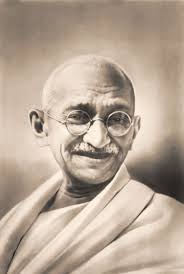Who is Mohandas Gandhi?
>> Thursday, February 11, 2010

Learn about the real Mohandas Gandhi and find out what shaped his philosophy of non-violence.
He is revered by millions as the Mahatma, meaning Great Soul.. To over 730 million Indians he is Bapu – father. Those in the West know of him as the inspiration behind the civil rights movements of the 60s. He is Mohandas Karanchand Gandhi – a small, man with a gaunt face and large eyes. His nose was too large for his face and his mouth sported a toothless smile. His cheeks were sunken and were topped by large round spectacles. You may remember Gandhi for his wise sayings but there is far more to the man than that. Let’s take a brief overview of two key events that shaped the life of the Mahatma.
At the age of 18, Mohandas Gandhi – a young Hindu from a comfortable Gujarati family – travels to Bombay on his way to England to study law. Before boarding his ship to England, however, Gandhi is called before his caste elders and told that if he goes to England he will be expelled from his caste. In the 1880s, Hindus were not to mix with Europeans. Gandhi refuses to cooperate and leaves India as an outcast from his Vaisya caste.
Gandhi finds a difficult life in England, and is forced to live on the fringes of society. He is discriminated against by so-called Christians and this puzzles him. His verdict on Western religion: “I love Christ, but I despise Christians because they do not live as Christ lived.”
Leaving England with a law degree, Gandhi travels to South Africa, where he plans to set up practice. There he finds blatant racial discrimination. Despite having a first class train ticket, he is forcibly removed from a train. That incident brings to the decision to never again yield to force and never to use force to win a cause.
These two early incidents in the man's life were pivotal to his life course. In the one he is rejected by his own people for wanting to associate with the white man. In the other, he is thrown off a train by white men because of his skin color.
On retuning to India, Gandhi was disturbed that hateful divisions and scars were evident in Indian society caused by the caste system. Gandhi was particularly offended by the attitude to the Untouchables. Gandhi took up the torch for the Untouchables. Restoring them their name – Harijan – Gandhi attempted to shame those who deny them basic human rights. Regarding temples that prohibited Harijan worshippers, Gandhi would proclaim, “There is no God here!” At times, Gandhi even lived among the Harijan people.
Gandhi hoped for a better India. In 1938 he said, “I hope to the last breath that India will make non-violence her creed, preserving the dignity of man." Unfortunately, Gandhi’s creed has not become a reality – in India or anywhere else on this earth. The man himself fell to violence and his country erupted in violence after his death. How much the world could now benefit from his wisdom.

0 comments:
Post a Comment